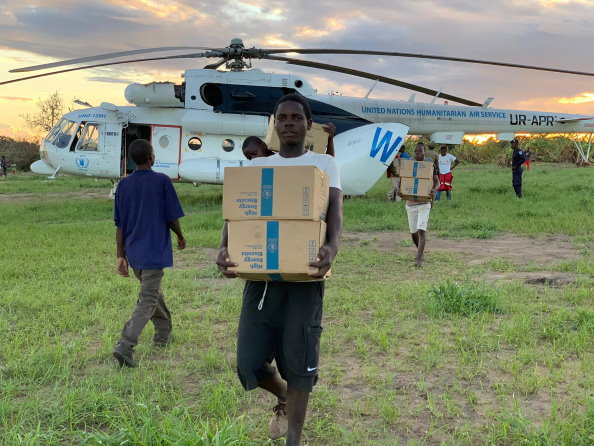One year since cyclone struck, many Mozambicans struggle to recover amid aid cuts
BEIRA/JOHANNESBURG – A year after Cyclone Idai devastated much of central Mozambique, limited funding for essential reconstruction is preventing many of the hardest-hit people from getting back on their feet, according to the United Nations World Food Programme (WFP).
In the weeks after the strongest storm to ever hit the country, WFP’s emergency assistance kick-started the recovery of the 1.8 million people. But many others, who are still struggling today, face a bleak and uncertain future.
Last month, funding shortfalls forced WFP to halve food rations for 525,000 people working on post-Idai recovery projects in the province of Sofala, the most damaged by the cyclone. This month, that vital support will be halted completely unless WFP receives funds soon.
“For people who had their lives turned upside down, our projects – community farms, road and bridge repair, the rebuilding of schools – are a source of hope,” said Lola Castro, WFP’s Regional Director for Southern Africa. “This essential work must continue if we want to see real and lasting recovery,” Castro added.
WFP needs US$91 million to be able to fully implement rehabilitation projects for Idai victims this year.
The upcoming April-May harvest is expected to be relatively good in the region. However, few of the 250,000 families whose homes were damaged by the cyclone have been able to return to their villages, let alone rebuild.
Many are subsistence farmers whose crops were wiped out last year and who were unable to replant in time for this year. Most are enduring “crisis” or “emergency” levels of food insecurity, meaning they do not eat enough, borrow what they can from relatives or friends, forage for less-than-nourishing wild foods, and continue to need outside help to survive.
Mozambique has one of the highest rates of chronic malnutrition in the world - afflicting 43 percent of children under five – while acute malnutrition is on the rise among Idai-affected communities. A rare outbreak of Pellagra, a disease triggered by Vitamin B3 deficiency, has sickened almost 4,000 people in Sofala, with the numbers increasing rapidly.
Given the country’s heavy dependence on rainfed, smallholder farming and its vulnerability to climate change – as underscored by Cyclone Kenneth causing widespread devastation just six weeks after Idai – significantly more investment is needed in climate change adaptation and disaster risk reduction.
“Boosting Mozambicans’ ability to withstand the impacts of increasingly severe drought and flooding was the core of our work before the cyclones struck”, said Castro. “It’s what we must resume now, and, with partners, step up in the coming years”.
# # #
The United Nations World Food Programme is the world’s largest humanitarian organization, saving lives in emergencies, building prosperity and supporting a sustainable future for people recovering from conflict, disasters and the impact of climate change.
Follow us on Twitter @wfp_media @wfp_Africa

